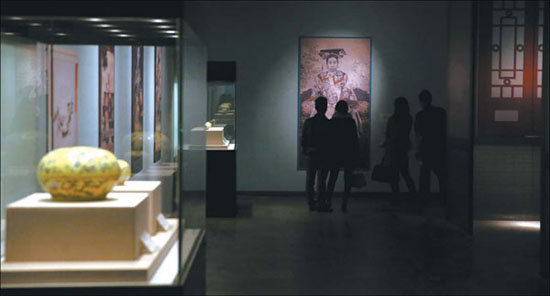
 |
| Ci Xi's China Exhibition held at Beijing's Capital Museum displays the Empress Dowager's good taste in her choice of porcelain. (China Daily/Jiang Dong) |
"In retrospect, the china belonging to Ci Xi represented the last rays of glory for the age-old art, before the fall of a long dark night," says Li Mei, the curator from the Capital Museum.
Empress Dowager Ci Xi died on Nov 15, 1908, after being the pinnacle of power for nearly half of century and spending a total of 300,000 taels of silver (about 344 million yuan, or $55 million in current value) on her insatiable taste for fine china. The end of the Qing Dynasty came three years later, in 1911.
But there is one final clue to who this strong woman was, and it comes from a few Chinese characters that form a seal which appears on everything from wash basins to flowerpots.
"Tiandi yijia chun" means "Heaven and Earth united in spring". According to Zhao, the words came from the name of a building inside the Old Summer Palace, which was burned down by the Anglo-French Allied Armies in 1860.
It was here, between 1855 and 1856, that a 21-year-old Ci Xi spent her pregnancy, basking in the love of her husband, the emperor.
"She remembered that period fondly and looked back on it often throughout her life," Zhao says. "Posterity has long painted her as an empress, a ruler and a villain. But they forgot she was also a woman."

















 Man's 20-year habit leads to kidney stone
Man's 20-year habit leads to kidney stone


![]()
